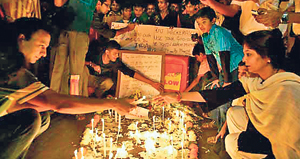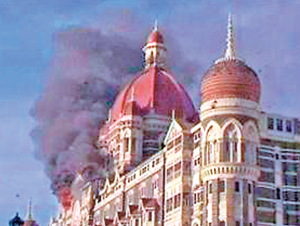By Laura Leigh Davidson
November 30 , 2008
Nearly three days of attacks on India's largest city finally ended on Saturday.
The disturbingly well-planned operation began Wednesday, when a team of ten gunmen stormed high profile sites throughout the city of Mumbai.
More than 180 people were killed as a result of the coordinated attacks on ten locations throughout the heavily populated city. Eighteen of the victims were from countries other than India, including six Americans.
More than 300 people were injured. Large groups of hostages were held at the Oberoi and Taj Mahal hotels, and at a Jewish community center called The Nariman House.
Indian police forces and specially trained commandos finished the final standoff at the five star Taj Mahal hotel on Saturday, where 200 hostages were being held. Only one of the gunmen, Azam Amir Kasab, a
21-year-old Pakistani, was captured alive. Kasab said he belonged to a Pakistani militant group with ties to the region of Kashmir, a senior police officer told reporters in Mumbai on Sunday.
India and Pakistan have been engaged in a bitter dispute over the Kashmir region since 1947, when both countries achieved independence as separate states. Since then, neither India nor Pakistan has been willing to give up its claim to the mountainous region that borders
multiple states between the geographic neighbors.
Tensions have erupted into three major wars over the last 60 years.
Despite the historic
conflict, the two
nuclear-armed nations have been working to improve relations in recent years. The current
ceasefire has lasted five years. But suspicions over the terror attacks of the past week have already strained the delicate
relationship.
". . .some elements in Pakistan are involved," Pranab Mukherjee, India's foreign minister, told CNN on Thursday.
The Pakistani
government has denied any connection to the terrorists. The attacks were "a heinous crime, and we
condemn it," Pakistani Prime Minister Yousuf Raza Gilani told CNN. "I think this terrorism is a menace for the whole world, and therefore we have to work jointly to
combat terrorism and extremism."
 |
| Members of the public observe a candle-lit vigil for the
victims of terror attacks in Mumbai. |
Pakistan's Prime Minister is sending a
representative from the Pakistani intelligence agency to help out with the ongoing investigation.
President George W. Bush has pledged full U.S. support to India. On Sunday, the President dispatched Secretary of State Condoleeza Rice to the Indian capital of New Delhi. Agents from the Federal Bureau of Investigation (FBI) have been sent to Mumbai to assist in the inquiry.
The violence in Mumbai marks a major increase in terror attacks on India's cities over the last year. The most recent assault was on October 30, when terrorists coordinated a series of explosions in four towns in the state of Assam in northeastern India.
The latest attacks have left many in India
wondering how a team of ten gunmen could have caused so much damage. Indian Prime Minister Manmohan Singh announced on Sunday that he is beginning bi-partisan talks to create a national anti-terror agency similar to the FBI.
As authorities sort out the questions surrounding the Mumbai attacks, the city also known as Bombay is starting the process of mourning and recovery.
(AP Photo/Altaf Qadri) |


